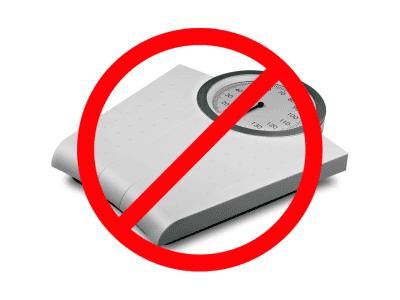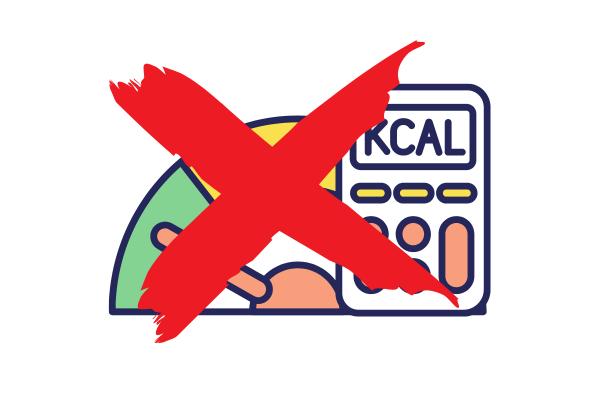10 Weight Loss Mistakes That Kill Your Progress
Embarking on a journey towards weight loss is an endeavor that demands both dedication and strategic planning. While the path to shedding pounds might seem straightforward, there are subtle weight loss mistakes that can significantly impact your progress.
This article delves into the ten common weight loss mistakes individuals often make during their weight loss journey, offering insightful guidance on how to avoid these pitfalls.
What almost everyone gets wrong about weight loss
By moving past these exercising and dieting mistake, you can enhance your chances of achieving sustainable and successful weight loss.
#1 Creating a Caloric Deficit Only Through Diet
Achieving a caloric deficit entails consuming fewer calories than your body expends, a fundamental step in shedding pounds. This can be accomplished either by reducing your food intake or increasing physical activity.
When a calorie deficit is solely attained through dietary restriction, it prompts significant compensatory responses. These include heightened appetite, increased food consumption, elevated levels of ghrelin (a hunger hormone), and decreased levels of PYY3-36 (a satiety factor in the gastrointestinal system) (King et al., 2011).
Therefore, I recommend generating a caloric deficit not only through dietary adjustments but also by increasing physical activities and exercises into your weight loss plan.
Check out: Losing weight without counting calories.
#2 Weight Loss Mistake: Insufficient Protein Intake
One often underestimated aspect is the importance of protein consumption. Not obtaining enough protein can indeed impede your progress in weight loss. Protein serves not only as a foundation for muscles but also plays a crucial role in satiety, metabolism, and overall success.
Foods rich in protein have a high satiety factor, ensuring prolonged feelings of fullness and satisfaction.
During weight loss, the body tends to break down not only fat but also lean muscle mass for energy. A proper protein intake aids in preserving lean muscle, which is metabolically active tissue that continues to burn calories even at rest.
The process of digesting and processing nutrients from food expends energy, known as the thermic effect of food (TEF). Protein elicits a greater TEF compared to carbohydrates and fats, resulting in more calories burned during the digestion of protein-rich foods.
According to the National Academy of Sports Medicine, aiming for a daily protein intake ranging between 1.6 and 2.2 grams of protein per kilogram of body weight (.73 and 1 grams per pound) is recommended during weight loss.
#3 Neglecting Strength Training
Strength training, also referred to as resistance training, involves activities such as weight lifting, utilizing resistance bands, or performing bodyweight exercises. Its major advantage lies in its impact on muscle metabolism.
Developing lean muscle mass boosts your resting metabolic rate, leading to increased calorie burn even during periods of rest.
During weight loss, approximately 25% of fat-free mass (muscle or organ tissue) is lost. Incorporating resistance training aids in maintaining or increasing muscle mass, ensuring that most of your weight loss is attributed to fat loss.
Strength training also contributes to body toning and improved body composition. Additionally, it enhances bone density, reducing the risk of osteoporosis—a condition characterized by weakened and brittle bones.

#4 Weight Loss Mistake: Relying on Fad Diets
Following a Fad diet can be a weight loss mistake. Fad diets, characterized by their promise of rapid and significant weight loss, rank among the most common mistakes individuals make during their weight loss journey. While these diets may gain quick popularity, they often fail to provide sustainable, long-term outcomes.
Fad diets often attract attention by offering quick fixes and extreme restrictions. While they might initially lead to weight loss, their unsustainable nature becomes evident over time.
Many fad diets involve the elimination of entire food groups, potentially leading to nutrient deficiencies. Our bodies require a balanced intake of carbohydrates, proteins, fats, vitamins, and minerals for optimal functioning.
Omitting essential nutrients can negatively impact your health and subsequently hinder your weight loss progress.
The restrictive nature of fad diets can result in intense cravings and episodes of binge eating. After discontinuing a fad diet, many individuals revert to their previous eating habits, causing their weight to rebound—a cycle known as yo-yo dieting.
#5 Insufficient Planning and Education
Effective weight loss goes beyond merely reducing calories or sporadic gym sessions. It demands meticulous planning, education, and an informed approach. Neglecting these aspects can lead to frustration, setbacks, and ultimately, failure to achieve sustainable weight loss.
Acquiring knowledge about portion sizes, calorie composition, and how to interpret food labels proves beneficial for weight loss and weight maintenance.
Preplanning well-balanced meals and snacks not only supports weight loss but also saves time and reduces stress during busy periods.
Approaching workouts without a clear plan can result in inefficiency and lack of progress. It’s advisable to outline your exercise routine in advance, specifying the types of exercises, duration, and intensity levels.

#6 Weight Loss Mistake: Unrealistic Goal Setting
Setting overly ambitious weight loss goals can result in disappointment and demotivation when progress is slower than anticipated. It’s crucial to establish realistic and gradual objectives that consider your individual circumstances.
For those with obesity, a recommended target rate of weight loss is set at a 1 to 2% reduction in body weight per week.
Beyond focusing solely on the numerical reading on the scale, pay attention to other indicators of progress. These could include heightened energy levels, improved fitness, enhanced sleep quality, and uplifted mood.
Tracking non-scale achievements offers a tangible way to observe your advancement and celebrate your accomplished milestones.

#7 Excessive Restriction and Deprivation
In the pursuit of weight loss, some individuals fall into the trap of extreme calorie restriction and deprivation, hoping for swift results. However, this approach can have adverse effects on both physical and emotional well-being.
Radically reducing calories often entails cutting out essential nutrients as well. This can lead to nutrient deficiencies, negatively affecting overall health and energy levels.
Excessive calorie restriction may trigger the breakdown of lean muscle tissue for energy. This not only lowers your metabolic rate but also compromises your strength and body composition.
#8 Weight Loss Mistake: Overtraining
As a weight loss specialist, I acknowledge the enthusiasm many individuals have to shed excess pounds rapidly. Nonetheless, it’s important to recognize that overtraining can hinder rather than accelerate your weight loss progress.
While exercise is undoubtedly pivotal for a successful weight loss journey, finding the right balance is crucial.
Engaging in intense and frequent workouts without allowing for adequate recovery time can result in muscle fatigue, decreased performance, and heightened risk of injury.
Moreover, it can lead to diminished motivation to sustain the journey, a key factor in achieving long-term weight loss. Be sure to give your body rest between workouts to avoid this weight loss mistake.
#9 Neglecting Sleep Habits
While diet and exercise often claim the spotlight in weight loss efforts, the role of sleep is frequently underestimated. Poor sleep habits can significantly impede your weight loss journey and overall well-being.
As highlighted in this paper : “Among 245 women enrolled in a 6-month weight-loss program, better subjective sleep quality increased the likelihood of successful weight loss by 33%, as did sleeping more than 7 hours per night.”

Weight Loss Mistake #10: Failing to Track Progress
Monitoring your efforts and outcomes is pivotal for maintaining motivation, making necessary adjustments, and celebrating achievements.
Documenting your meals and workouts holds you accountable for your choices, promoting mindfulness regarding your consumption and activity levels.
Tracking empowers you to identify patterns that could be influencing your progress. For instance, you might uncover specific foods that trigger overeating or recognize times when you’re more prone to skipping workouts.
Seeing your efforts documented and observing positive transformations over time can bolster your motivation and commitment to your weight loss goals.






